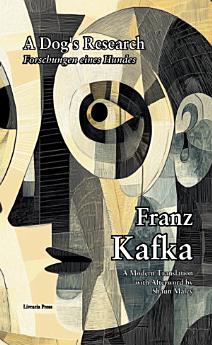A Dog's Research
The Complete Works of Franz Kafka หนังสือเล่มที่ 26 · Continental Press
eBook
128
หน้า
family_home
มีสิทธิ์
info
reportคะแนนและรีวิวไม่ได้รับการตรวจสอบยืนยัน ดูข้อมูลเพิ่มเติม
เกี่ยวกับ eBook เล่มนี้
This has been translated as "Investigations of a Dog" or "Researches of a Dog" and other variations. The original German title was "Forschungen eines Hundes". In the narrative tradition of Voltaire in works such as "Micromégas" (1752), Kafka's story is narrated by a dog who reflects on his life and engages in an obsessive investigation of the mysterious forces governing his world, particularly focusing on the nature of sustenance and survival. The dog questions why food appears as if by magic and struggles to comprehend the rituals and behaviors of other dogs. His inquiries, however, are fraught with frustration, as he is unable to find satisfactory answers, leading to an ongoing sense of existential confusion. "A Dog's Research" can be read as a satirical and philosophical commentary on the limits of human understanding and the search for meaning, just like Voltaire's comedic-philosophic works. The dogs futile quest for knowledge mirrors the human condition, where ultimate truths often remain elusive despite relentless effort. The storys tone, blending humor with melancholy, underscores the tension between curiosity and the inherent limitations of perception. Kafkas use of the dog as a narrator allows him to examine human behaviors and social structures from an outsiders perspective, making this story a profound meditation on existence and the pursuit of knowledge.
เกี่ยวกับผู้แต่ง
A Bohemian novelist and short-story writer, Kafka's work, which fuses elements of realism and the fantastic, typically features isolated protagonists facing bizarre or surrealistic predicaments and incomprehensible socio-bureaucratic powers. His writings, such as "The Metamorphosis" and "The Trial," explore themes of alienation, existential anxiety, and guilt, and are influential in modernist literature.
ให้คะแนน eBook นี้
แสดงความเห็นของคุณให้เรารับรู้
ข้อมูลในการอ่าน
สมาร์ทโฟนและแท็บเล็ต
ติดตั้งแอป Google Play Books สำหรับ Android และ iPad/iPhone แอปจะซิงค์โดยอัตโนมัติกับบัญชีของคุณ และช่วยให้คุณอ่านแบบออนไลน์หรือออฟไลน์ได้ทุกที่
แล็ปท็อปและคอมพิวเตอร์
คุณฟังหนังสือเสียงที่ซื้อจาก Google Play โดยใช้เว็บเบราว์เซอร์ในคอมพิวเตอร์ได้
eReader และอุปกรณ์อื่นๆ
หากต้องการอ่านบนอุปกรณ์ e-ink เช่น Kobo eReader คุณจะต้องดาวน์โหลดและโอนไฟล์ไปยังอุปกรณ์ของคุณ โปรดทำตามวิธีการอย่างละเอียดในศูนย์ช่วยเหลือเพื่อโอนไฟล์ไปยัง eReader ที่รองรับ











